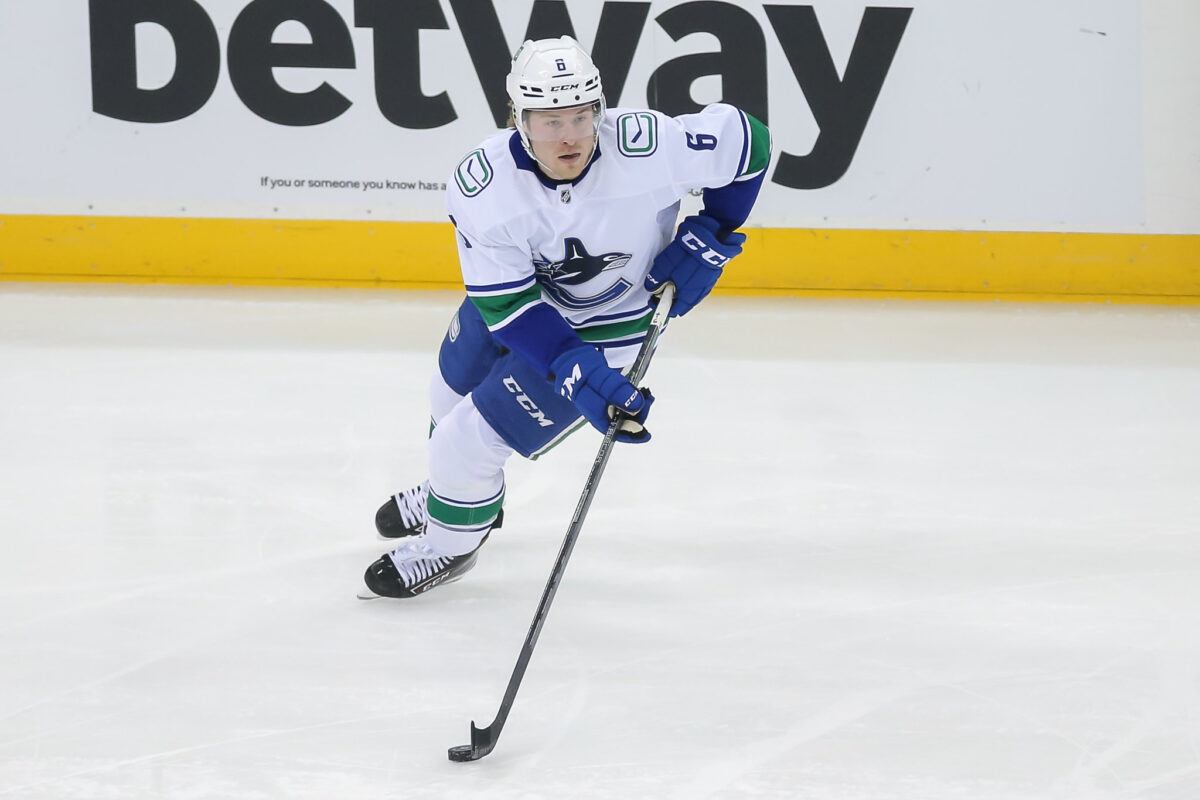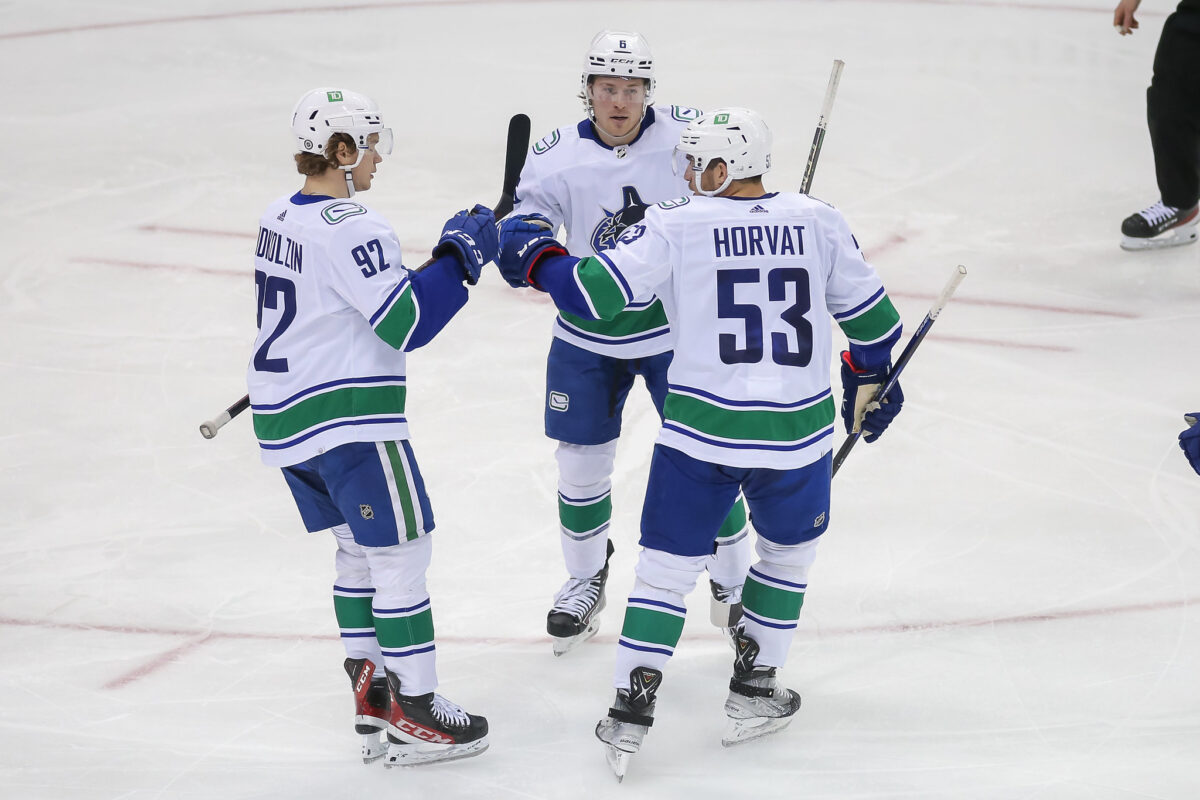With less than two weeks to go before the NHL Trade Deadline, we’re starting to get a better sense of which teams are in the market for an upgrade, and what players are available to them. Earlier in the season, the Vancouver Canucks were well on their way to missing the postseason, with a record of 8-15-2. Fast forward to today, the team has gone 7-2-1 over their last 10 games and they sit just two points out of a wild card spot. It does garner the idea that the Canucks’ recent surge should change their trade deadline plans.
News and rumours are still out on some of the bigger names in Vancouver, but are they now not as willing to trade away the likes of J.T. Miller? Could an extension for Brock Boeser be worked on before the season ends? Could Vancouver look to potentially add instead of sell at the deadline? These are, or should be, legitimate thoughts heading into the deadline on March 21.
Miller Shouldn’t Be Dealt at All
One of two things will happen with Miller with the deadline in mind. Either the cost for him will be astronomical after collecting six points over his last two games, including a four-point outing against the Montreal Canadiens, or he won’t be traded at all because the return won’t be enough for the value being given up. In fact, to go a step even further, the Canucks shouldn’t deal Miller whatsoever before the deadline.
Miller currently leads the Canucks this season in both goals (23), and points (69), and is riding an 11-game point streak, where he has collected a ridiculous 23 points. He also still has another year on his current contract with an average annual value (AAV), of $5.2 million. Vancouver might opt to not move Miller at all, especially with the way the team is climbing the standings. Throw in his versatility to play centre and the wing, plays both on the power play and penalty kill, they’d be losing a player that plays in nearly every dimension for them.
Related: NHL Stats News: Oilers, Maple Leafs, Canucks, Senators, Panthers
So, unless the offer is so monumental that the Canucks just can’t say no, it might be wise to hang onto the 28-year-old, who is playing some of the best hockey of his career.
Extension for Boeser Can Happen as Well
The topic of conversation surrounding Boeser and his looming restricted fee agent (RFA) status, is that if Miller is moved, it will free up the cap space to extend him. The fact of the matter is, though, that with money coming off the books — if the Canucks general manager Patrik Allvin can move a little money around — an extension for Boeser can happen as well.
On the Canucks’ Cap Friendly page, their buyout amount will jump from $550,000 to $2.4 million — the $3.035 million in recapture penalty from the retirement of Roberto Luongo finally comes off the books. Throw in the $1.5 million from unrestricted free agent (UFA) Jaroslav Halak (if he doesn’t get dealt beforehand), along with pending UFAs Brad Hunt, Tyler Motte and Madison Bowey, there’s some lose change laying around.
That extension doesn’t also have to break the bank. Boeser currently has an AAV of $5.875 million, and a player like William Nylander of the Toronto Maple Leafs and his contract could be a good comparable. Nylander has a cap hit of $6.926 million, and the stats between the two are quite similar. Nylander in 416 games has totaled 317 points, which works out to .76 points per game (P/G). Boeser on the other hand has scored 244 points in 306 games, which works out to .79 P/G. Nylander has broken the 20-goal plateau in four seasons, notching 31 in the 2019-20 season, while Boeser has hit that mark on three occasions, with 29 being his career high back in 2017-18.

If Nylander is the benchmark and both sides can settle on a deal somewhere around that $7 million range, it would only be a $1.125 million raise (which, yes, is a lot of money in the modern world), but against the cap isn’t a major hit. Keeping a perennial 20-goal scorer at the age of 25 long term should be one of the top priorities for the Canucks this offseason.
Canucks Look To Potentially Add?
Listen, this wasn’t a talking point just a few weeks ago, but the Canucks are just a win out of a wild card spot, and with a little extra boost, they could sneak their way in. If the team does potentially add, they won’t need a major piece to bolster their lineup. One of the best parts for Vancouver is that they don’t really need a top-six forward, top-four defensemen or a starting goaltender.
The forward group up front has plenty of options that can get the job done. With the likes of captain Bo Horvat, Elias Pettersson, Conor Garland, Miller and Boeser, they’re set there. Throw in veteran players like Tanner Pearson and Jason Dickinson, both who have been on playoff runs before, so adding a bottom-six forward to add some depth would be a smart, and the less expensive move to make.
You may also like:
- Canucks News & Rumours: Kämpf, McKenna, Blueger & 1st Round Draft Pick
- Canucks Week Ahead: Schedule & Storylines – Pettersson to Kings, Lekkerimaki/Chytil Injuries & More
- Canucks News & Rumours: Lankinen, Lekkerimäki & Patterson
- NHL Rumours: Kyrou Trade Heating Up, Weegar Interest & Deals Ready
- Canucks News & Rumours: Chytil, Dervin, Bains & What’s Next?
On defence, similarly to up front, the top four is mostly taken care of, with Quinn Hughes, Tyler Myers, Oliver Ekman-Larsson and Travis Hamonic occupying those spots. Add in Luke Schenn and Tucker Poolman (when he returns from injury), and unless Vancouver really swings for the fences, a depth piece would be the only real need there.
Finally, in goal, Thatcher Demko is the guy now and for the future. At just 26 years of age, and locked in a five-year contract with an AAV for $5 million, he has been fantastic this season, sporting a 2.64 goals-against average (GAA), along with a .917 save percentage (SV%). There is no worry in this area, Demko is their guy.

Whether this actually becomes the case or not remains to be seen, but if the Canucks are anywhere near, or in, a playoff spot before the trade deadline, their plans should be considered greatly.